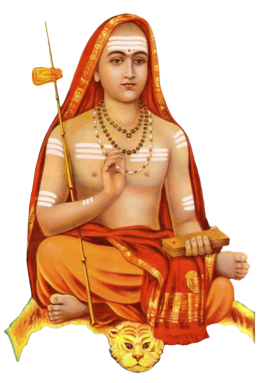अतश्चित्तं समाधेहि प्रत्यग्रूपे परात्मनि ॥ ४0७ ॥
ataścittaṃ samādhehi pratyagrūpe parātmani || 407 ||
निरुपममतिवेलं नित्यमुक्तं निरीहम् ।
निरवधिगगनाभं निष्कलं निर्विकल्पं
हृदि कलयति विद्वान् ब्रह्म पूर्णं समाधौ ॥ ४0८ ॥
nirupamamativelaṃ nityamuktaṃ nirīham |
niravadhigaganābhaṃ niṣkalaṃ nirvikalpaṃ
hṛdi kalayati vidvān brahma pūrṇaṃ samādhau || 408 ||
Something—which is inexpressible in terms of speech or thought.
समरसमसमानं मानसं बन्धदूरम् ।
निगमवचनसिद्धं नित्यमस्मत्प्रसिद्धं
हृदि कलयति विद्वान् ब्रह्म पूर्णं समाधौ ॥ ४0९ ॥
samarasamasamānaṃ mānasaṃ bandhadūram |
nigamavacanasiddhaṃ nityamasmatprasiddhaṃ
hṛdi kalayati vidvān brahma pūrṇaṃ samādhau || 409 ||
Established .—We cannot deny the Self for the Vedas speak of It.
Ever familiar—Nobody can ever conceive that he is not. For a discussion on the subject refer to the Sâriraka Bháshya on the Brahma-Sutras I. i. 2.
स्तिमितसलिलराशिप्रख्यमाख्याविहीनम् ।
शमितगुणविकारं शाश्वतं शान्तमेकं
हृदि कलयति विद्वान् ब्रह्म पूर्णं समाधौ ॥ ४१0 ॥
stimitasalilarāśiprakhyamākhyāvihīnam |
śamitaguṇavikāraṃ śāśvataṃ śāntamekaṃ
hṛdi kalayati vidvān brahma pūrṇaṃ samādhau || 410 ||
विलोकयात्मानमखण्डवैभवम् ।
विच्छिन्द्धि बन्धं भवगन्धगन्धितं
यत्नेन पुंस्त्वं सफलीकुरुष्व ॥ ४११
vilokayātmānamakhaṇḍavaibhavam |
vicchinddhi bandhaṃ bhavagandhagandhitaṃ
yatnena puṃstvaṃ saphalīkuruṣva || 411
भावयात्मानमात्मस्थं न भूयः कल्पसेऽध्वने ॥ ४१२ ॥
bhāvayātmānamātmasthaṃ na bhūyaḥ kalpase’dhvane || 412 ||
माभासरूपेण फलानुभूत्या ।
शरीरमाराच्छववन्निरस्तं
पुनर्न संधत्त इदं महात्मा ॥ ४१३ ॥
mābhāsarūpeṇa phalānubhūtyā |
śarīramārācchavavannirastaṃ
punarna saṃdhatta idaṃ mahātmā || 413 ||
The man of realisation never identifies himself with the body, not even during his return to the normal plane after Samadhi.
Vivekachudamani – Introduction
1: Devoted Dedication
2: Glory of Spiritual Life
3: Unique Graces in Life
4-7: Miseries of The Unspiritual Man
8-13: Means of Wisdom
14-17: The Fit Student
18-30: The Four Qualifications
31: Bhakti – Firm and Deep
32-40: Courtesy of Approach and Questioning
41-47: Loving Advice of the Guru
48-49: Questions of the Disciple
50: Intelligent Disciple – Appreciated
51-55: Glory of Self-Effort
56-61: Knowledge of the Self-Its Beauty
62-66: Direct Experience – Liberation
67-71: Discussion on Questions Raised
72-75: Gross Body
76-82: Sense Objects a Trap – Man Bound
83-86: Fascination for Body Criticised
87-91: Gross Body Condemned
92: Organs of Perception and Action
93-94: Inner Instruments
95: The Five Pranas
96-101: Subtle Body – Effects
102: Functions of Prāna
103-105: Ego Discussed
106-107: Infinite Love – the Self
108-110: Māyā – Pointed Out
111-112: Rajoguņa – Nature and Effects
113-116: Tamoguņa – Nature and Effects
117-119: Sattvaguņa – Nature and Effects
120-121: The Causal Body – Its Nature
122-123: Not-Self – Description
124-135: The Self – Its Nature
136: Advice for Self-control
137-142: What is Bondage – The Reply
143-144: The Powers – Agitation and Veiling
145-146: Bondage in Action
147-153: Ātman and Anātman – Discrimination
Negation of the Kośas
154-164: – Annamaya kośa (Food sheath)
165-166: – Prņamaya kośa (Vital air sheath)
167-183: – Manomaya kosa (Mental sheath)
184-188: – Vijnanamaya kośa (Intellectual sheath)
189-191: Ātman – Unattached
192-193: What is Liberation? – Disciple
194-206: Self-Knowledge gives Liberation
207-210: Anandamaya kośa (Bliss sheath)
211: Ātman – Other than the Five Kośas
212: What is Ātman? – Disciple
213-225: Nature of the Self – Discussion
226-236: All Manifestation Absolute
237-240: Brahman – Its Nature
241-249: That Thou Art – Explanation
250-253: Attitude in Meditation
254-266: Aids to Meditation
267-276: Give up Vāsanās – the Method
277-292: End Superimposition – The Means
293-297: The Perceived I’ Factor – False
298-309: Condemnation of the Ego
310-319: Actions, Thoughts and Vāsanās – Renounce
320-329: Total Vigilance – Its Price
330-338: In the One, No Plurality
339-348: Spiritual Growth – the Secret
349-353: Cause-Effect – False
354-372: Samadhi – Its Nature
373-378: Fully Detached – Samadhi Easy
379-383: Meditation – the Technique
384-397: Continuous Attention to Self
398-406: No Diversity in Reality
407-413: Ātma-vicāra – Contemplation
414-418: Give up Perceptions
419-425: The Science of Reality – Its Benefits
426-445: Signs of a Realised Seer
446-464: Prārabdha for a Saint
465-471: There is No Plurality
472-479: Experience of Selfhood
480-520: Practice of Knowledge – Disciple
521-575: Final Words of Advice
576-578: Blessed Disciple Liberated
579-581: The Glory of the Textbook

Vivekachudamani – Verses 407-413 – Vivekachudamani Verses 407-413 – By Adi Sankaracharya – In Sanskrit with English Meaning, Transliteration, Translation, Commenary, Lyrics, Audio – Vivekachudamani-407-413
